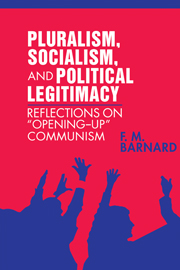Book contents
- Frontmatter
- Contents
- Preface
- 1 Introduction
- 2 The Context
- 3 Socialist pluralism and pluralist socialism
- 4 Ideological differentiation under socialism
- 5 Socialism and the language of sentiment
- 6 Socialism and the language of rationality
- 7 Socialism, politics, and citizenship
- 8 Conclusion
- Appendix: Electoral confrontation under socialism
- Index
1 - Introduction
Published online by Cambridge University Press: 25 January 2010
- Frontmatter
- Contents
- Preface
- 1 Introduction
- 2 The Context
- 3 Socialist pluralism and pluralist socialism
- 4 Ideological differentiation under socialism
- 5 Socialism and the language of sentiment
- 6 Socialism and the language of rationality
- 7 Socialism, politics, and citizenship
- 8 Conclusion
- Appendix: Electoral confrontation under socialism
- Index
Summary
Not least remarkable among the innovative ideas of the thought experiment known as the Prague Spring was the emergence of a version of pluralism that might perhaps best be described as civic pluralism. Decidedly at variance with the “English” pluralism of the guild socialists, it was very different also from “American” pluralism, where the primary emphasis is on interest-group rivalry and pressure-group activity.
Moreover, this new version of pluralism was no less novel as a critique of socialist thinking. For, unlike the tradition of Western political thought, in which citizenship ranks as one of the supreme human values, the tradition of socialism appears in the main to have looked upon complaints about the denial of citizenship as being too narrow a grasp of human bondage to merit foremost placing in the schedule of human laments.
In the socialist tradition, broadly considered, the primary grievance is not civic passivity, or even political tyranny, but the dominance of things. In Marx's theory of alienation, for example, tyranny is mediated only indirectly through human beings, since, directly, humans are themselves the victims of things. If, therefore, politics is viewed as the realm of outcomes fundamentally generated by nonhuman forces, as it frequently is within this theory, then humans can hardly expect that it will assuage their fears or sustain their true ends or purposes. On the contrary, in being itself the product of a hidden, nonhuman dominance, politics is most likely to conceal or, at best, deflect true human needs.
- Type
- Chapter
- Information
- Pluralism, Socialism, and Political LegitimacyReflections on Opening up Communism, pp. 1 - 20Publisher: Cambridge University PressPrint publication year: 1992



